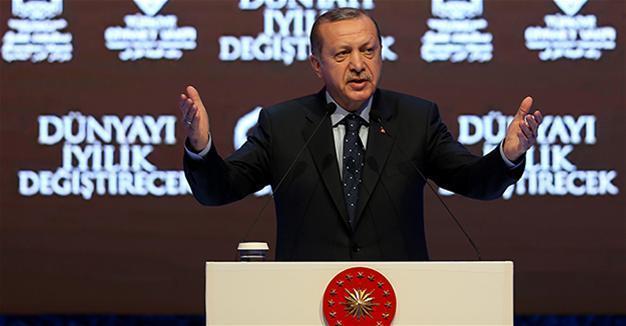Netherlands will pay the price: Turkey's Erdoğan
ANKARA / ROTTERDAM
 Turkey told the Netherlands on March 12 that it would retaliate in the “harshest way” after Turkish ministers were barred from speaking in Rotterdam in a row over campaigning among Turks living in the country.
Turkey told the Netherlands on March 12 that it would retaliate in the “harshest way” after Turkish ministers were barred from speaking in Rotterdam in a row over campaigning among Turks living in the country.“If you sacrifice your relationship with Turkey for the elections [on March 15], you will pay the price,” Turkish President Recep Tayyip Erdoğan said on March 12 at a ceremony in Istanbul.
“We have yet not done what is required,” Erdoğan added.
Erdoğan said the West “has shown its true face.”
“I thought that Nazism was over, but I was wrong,” he said. “In fact, Nazism is up on its feet in the West.”
On March 11, the Dutch government first canceled Turkish Foreign Minister Mevlüt Çavuşoğlu’s flight permit to the Netherlands and then blocked a convoy carrying Turkish Family Minister Fatma Betül Sayan Kaya from entering the Turkish consulate in Rotterdam in Turkey’s latest argument with an EU ally.
Kaya was escorted by the Dutch police to Germany after she was declared “persona non grata” amid a police intervention against Turks who gathered in front of the consulate building in Rotterdam.
An apology from the Netherlands will not be enough to normalize relations, Çavuşoğlu said March 12, adding that the country’s actions would have consequences.
He also reiterated that the Dutch ambassador to Turkey, Cornelis van Rij, could not re-enter Turkey.
“To begin with, this will have a response. Apologizing is not enough. We have begun to give a response and said the ambassador should not come to the country and he cannot. We will take steps and then the Netherlands will apologize. Otherwise, we will continue to take these steps,” Çavuşoğlu told reporters in Metz, France.
Kaya said she suffered “harsh and rude treatment” at the hands of Dutch authorities.
“I went there to meet our electorate. I went to meet them at our consulate which is part of our homeland, and we do not need to get permission for that,” she told reporters on March 12 after her plane landed at Istanbul Atatürk Airport from Germany’s Cologne-Bonn airport.
She said she was taken to Germany, crossing at Nijmegen, while “democratic and humanitarian values were trampled upon.”
“We were subjected to inhumane and unethical treatment,” the minister said.
“We were treated harshly and rudely. The European attitude toward a female minister three days after International Women’s Day is a tragicomedy,” she said.
Protests erupted in the Dutch port city of Rotterdam late on March 11 outside the Turkish consulate.
More than 1,000 people waving Turkish flags gathered on the street leading to the consulate.
“The people are very angry tonight. They feel that their freedom of expression has been denied. We are demonstrating because we want to hear our ministers speak,” Said Marti, 50, from Rotterdam, told Agence France-Presse.
After several hours of calm demonstrations, police moved in early March 12 to disperse the protesters, charging the crowd on horseback and using dogs to regain control.
Protesters hit back, throwing rocks at riot police, while hundreds of cars jammed the streets blaring their horns and revving their engines.
The Rotterdam police said seven people were detained during the protests.
The Dutch first withdrew the landing rights of Çavuşoğlu because of objections to his intention to attend a rally in Rotterdam for a referendum on constitutional reforms to expand the president’s powers. Turkish officials have been campaigning in various European cities with Turkish populations before the April 16 referendum.
With Turkey facing stinging criticism in Europe over its human rights record, the ministers were attempting to campaign in the Netherlands just four days before a Dutch election in which far-right candidate Geert Wilders is poised to increase his share of the vote after having campaigned on an anti-immigrant platform that has attacked Turks.
The Dutch government said it withdrew the permission because of “risks to public order and security,” leading Çavuşoğlu to say: “So is the foreign minister of the Turkish republic a terrorist?”
On late March 11, a Turkish Foreign Ministry official said entries and exits had been closed to the Netherlands’ consulate in Istanbul and embassy in Ankara. Similar precautions were taken at the Dutch chargé d’affaires’ house and the ambassador’s residence.
The Turkish Foreign Ministry said late March 11 that they had conveyed to the Netherlands their desire to not see the envoy, van Rij, return to his post for a while.
“It has been notified that we do not wish for the Dutch ambassador, who is currently on leave outside of Turkey, to return to his job for a while,” read a statement issued by the Foreign Ministry.
Turkish EU Minister Ömer Çelik also slammed the Dutch authorities for engaging in “complete fascism.”
“Fascism has awoken in the Netherlands and has taken stage. All real democrats in the world should react to this for a free world,” Çelik wrote on Twitter.
















